Add this eBook to your basket to receive access to all 1,953 records. Our indexes include entries for the spelling pratt. In the period you have requested, we have the following 1,953 records (displaying 71 to 80): These sample scans are from the original record. You will get scans of the full pages or articles where the surname you searched for has been found. Your web browser may prevent the sample windows from opening; in this case please change your browser settings to allow pop-up windows from this site. PCC Probates and Administrations
(1632)
The Prerogative Court of Canterbury's main jurisdiction was central and southern England and Wales, as well as over sailors &c dying abroad: these brief abstracts, compiled under the title "Year Books of Probates", and printed in 1902, usually give address, date of probate and name of executor or administrator. They are based on the Probate Act Books, cross-checked with the original wills, from which additional details are, occasionally, added. The original spelling of surnames was retained, but christian and place names have been modernised where necessary. | Sample scan, click to enlarge
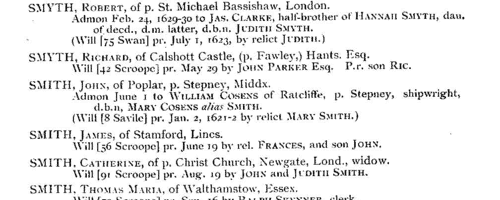
| PCC Probate Abstracts
(1630-1634)
The Prerogative Court of Canterbury's main jurisdiction was central and southern England and Wales, as well as over sailors &c dying abroad: these brief abstracts usually give address, date of probate and name of executor or administrator
| Sample scan, click to enlarge

| Inhabitants of Cambridge
(1504-1635)
Cambridge comprised fourteen ancient parishes, plus the university (which was extra-parochial), in the diocese of Ely. The church of St Mary the Great (as opposed to St Mary the Less) in the Market Place (juxta forum) has churchwardens' accounts surviving from 1504 onwards. Those from 1504 to 1635 were transcribed by J. E. Foster for the Cambridge Antiquarian Society and published in 1905. The two churchwardens were chosen annually: the previous year's churchwardens each chose another parishioner: those two then each chose three other parishioners: the resulting eight then chose the new year's churchwardens, the wardens of the Light of the Rood, and the wardens of the Mass of Jesus. Auditors were also chosen, usually out of the eight, to examine all the wardens' accounts at the end of the year. The churchwardens' accounts are largely concerned with the costs of repair of the church and its furnishings, and include the names of tradesmen and workmen. Each Easter a rate called Easter money was raised was raised from all householders in the parish, and additional rates are occasionally levied for unusual expenses, such as steeple reconstruction. These 'Easter book' lists give a complete list of householders for the parish, excepting the poor. The church's income also included the rents from some houses in the parish, and the names of the tenants appear. The offices of the Light of the Rood and the Mass of Jesus were abolished during the Reformation. The accounts of the Light of the Rood, i. e., for candles burnt before the crucifix, often include a list of sums received for funerary diriges (dirges) for the year, from which the year of death of the more prosperous parishioners can be traced in this early period. | Sample scan, click to enlarge

| English passengers to New England
(1632-1637)
Samuel G. Drake searched British archives from 1858 to 1860 for lists of passengers sent from England to New England, publishing the results in 1860 in Boston, Massachusetts. Adult emigrants transported to New England in the period 1632 to 1637 had to take oaths of allegiance and religious conformity, certified by parish priest, mayor or justices, and these certificates form the core of this book, but it also includes a list of 'Scotch Prisoners sent to Massachusetts in 1652, by Order of the English Government', and various other passenger lists and documents, dating as late as 1671. The early lists included the children, and normally gave the full name and age of each person. This is the index to the passengers. | Sample scan, click to enlarge
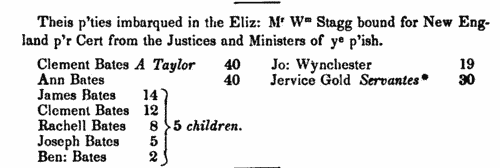
| Immorality and heresy in Northumberland and Durham
(1626-1638)
Sexual and religious behaviour, marriage and probate were under the purview of the ecclesiastical courts in England at this period, exercised through the individual dioceses and archdeaconries. The diocese of Durham included the whole of county Durham, Northumberland (except for Hexhamshire) and Alston in Cumberland. The High Commission Court dealt with cases from the whole diocese, and a book of court acts from 1628 to 1639, and another of depositions from 1626 to 1638, survived in the dean and chapter library, were edited by W. Hylton Dyer Longstaffe, and published by the Surtees Society in 1858. This is not a complete abstract of the record: there are hundreds of cases for contempt of the ordinary jurisdiction, of which only a few were selected as examples 'in consequence of the rank of the persons proceeded against or other contents of interest'. However, all cases in which the nature of the offence occurs are traced from start to finish, but omitting much of the proceedings in between. The names and ages of all the deponents are recorded. | Sample scan, click to enlarge

| Inhabitants of Somerset
(1625-1639)
The Reverend E. H. Bates Harbin prepared extracts from the Somerset quarter session records of 1625 to 1639 for publication by the Somerset Record Society (xxiv) in 1908. The period is covered by quarter sessions minute book 2 (part) and 3; these are based on the rolls of recognizances; criminal indictments; and the sessions rolls (which also supplied a hiatus in book 2 for most of 1627). | Sample scan, click to enlarge
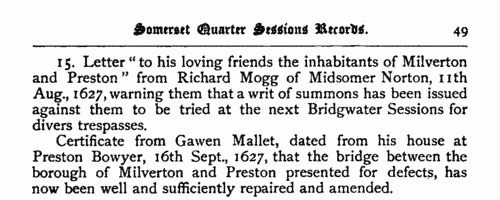
| Southwell Peculiar Baptisms, Marriages and Burials
(1614-1641)
Each year a copy of the previous year's register of baptisms, marriages and burials, attested by the incumbent and churchwardens, was returned to the diocesan authorities. The peculiar of Southwell in Nottinghamshire was ordinarily exempt from episcopal jurisdiction in such matters, and the 24 parishes in the peculiar made similar returns to the Southwell registry. A few of these survive from this period, and they were transcribed by T. N. Blagg and printed as the first volume of the Record Series of the Thoroton Society in 1903. The returns are for Beckingham 1634, 1637, 1641; Bleasby 1633; Blidworth 1638; Calverton 1617, 1623; *Caunton 1614, 1619, 1628, 1641; Cropwell Bishop 1638, 164; Darlton 1622, 1633, 1641; *Dunham 1641; Edingley 1638; Farnsfield 1623; Halam 1622, 1637; Halloughton 1622, 1637; *Holme 1623, 1625, 1627, 1638, 1641; Kirklington 1622, 1638; *Morton 1622, 1623; *North Muskham 1623, 1633, 1638; South Muskham 1623; *Norwell 1638, 1641; Oxton 1622; *Ragnall 1623; Southwell 1633, 1640; Tithby (cum Cropwell Butler) 1625; Upton 1633, 1638; and Woodborough 1623, 1627, 1637, 1638 and 1640. Parishes marked with an asterisk (*) are those for which the original registers were missing for the period covered by the transcripts. | Sample scan, click to enlarge
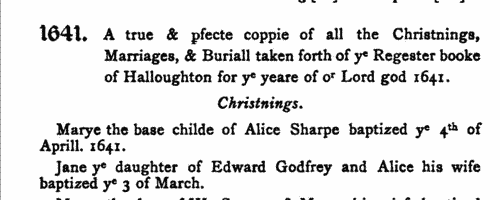
| Official Papers
(1641-1643)
The State Papers Domestic cover all manner of business relating to Britain, Ireland and the colonies, conducted in the office of the Secretary of State as well as other miscellaneous records. These records are from June 1641 to December 1643: there is also a set of abstracts of navy correspondence.
| Sample scan, click to enlarge
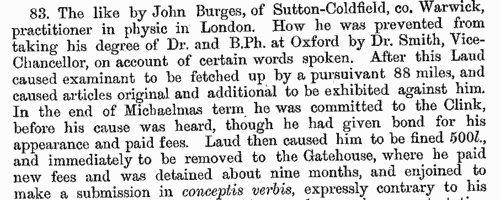
| PCC Probates and Administrations
(1645)
The Prerogative Court of Canterbury's main jurisdiction was central and southern England and Wales, as well as over sailors &c dying abroad: these brief abstracts, compiled under the title "Year Books of Probates", and printed in 1906, usually give address, date of probate and name of executor or administrator. They are based on the Probate Act Books, cross-checked with the original wills, from which additional details are, occasionally, added. The original spelling of surnames was retained, but christian and place names have been modernised where necessary. | Sample scan, click to enlarge
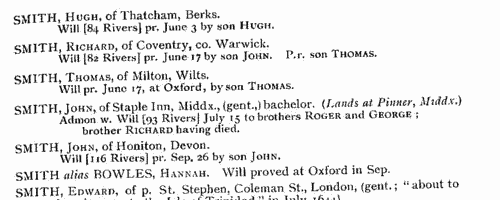
| PCC Probates and Administrations
(1646)
The Prerogative Court of Canterbury's main jurisdiction was central and southern England and Wales, as well as over sailors &c dying abroad: these brief abstracts, compiled under the title "Year Books of Probates", and printed in 1906, usually give address, date of probate and name of executor or administrator. They are based on the Probate Act Books, cross-checked with the original wills, from which additional details are, occasionally, added. The original spelling of surnames was retained, but christian and place names have been modernised where necessary. | Sample scan, click to enlarge
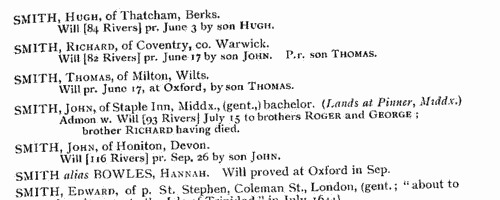
|
Research your ancestry, family history, genealogy and one-name study by direct access to original records and archives indexed by surname.
|











